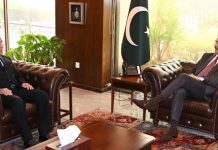ISLAMABAD /DNA/ – A leak from a Swiss bank has revealed the hidden wealth of its clients, including hundreds of Pakistanis, ranging from business people to politically exposed individuals and those who have been investigated, and in some cases convicted, in connection with various criminal actions, The News reported.
The data reveals that 1,400 Pakistani citizens are linked to approximately 600 Credit Suisse accounts. It also included information about accounts that were closed but were still operational in the past.
Details relating to around 18,000 accounts and 30,000 account holders holding in excess of $100 billion in one of the world’s largest private banks, Credit Suisse, are included in the breach. This is not all of the data available about the bank, which has 1.5 million private banking clients. Suisse Secrets is the only recorded leak of client data from a major Swiss bank to the media.
According to the report, the accounts of Pakistanis are diverse in nature. Additionally, they include individuals who have been or are currently under investigation by the National Accountability Bureau. Additionally, there are instances where the accused opened accounts while the investigation was ongoing and NAB was unaware of the transaction.
Numerous politically exposed individuals opened their accounts while holding public office and failed to disclose this fact in their asset declarations submitted to the Election Commission of Pakistan. One such individual received a substantial sum of money from Credit Suisse, at the height of his political career.
One of the wealthiest accounts held by a Pakistani at the bank was also owned by a politically exposed individual.
Additionally, the data contained details about several cases currently under investigation in Pakistan in which investigators were given incorrect information about the assets under scrutiny. While many believe that the phenomenon of fake accounts is limited to Pakistani banks, it has emerged that Pakistanis have also used Credit Suisse to open accounts in their proxies’ names in the absence of the bank conducting proper due diligence.
The average maximum balance in Pakistanis’ accounts was 4.42 million Swiss francs (Rs841 million), compared to the leaked data’s overall average of 7.5 million Swiss francs (Rs1.42 billion). Almost two hundred clients worth more than 100 million Swiss francs (Rs19 billion) were discovered in the data, and more than a dozen had accounts worth billions.
A whistle blower shared this data with German newspaper, Süddeutsche Zeitung, which coordinated the project along with the Organised Crime and Corruption Reporting Project, the world’s biggest investigative journalism organisation with its presence in all continents. In a statement, the whistleblower declared the secrecy laws of Swiss banking as immoral.
He said: “The pretext of protecting financial privacy is merely a fig leaf of covering the shameful role of Swiss banks as collaborators of tax evaders.” Credit Suisse responding to questions sent by journalists rejected the allegations and said the details uncovered by reporters are based on “selective information taken out of context, resulting in tendentious interpretations of the bank’s business conduct.” More than 160 journalists from 48 media outlets in 39 countries across the world spent months analysing bank account information leaked from Credit Suisse, Switzerland’s second-largest lender.
While some accounts in the data dated back to the 1940s, more than two-thirds were opened from 2000 onward. Many of them were still open well into the last decade. News Desk adds: The client rosters of Swiss banks are among the world’s most closely guarded secrets, protecting the identities of some of the planet’s richest people and clues into how they accumulated their fortunes, the New York Times reported.
The data covers accounts that were open from the 1940s until well into the 2010s but do not cover the bank’s current operations. Among the people listed as holding amounts worth millions of dollars in Credit Suisse accounts were King Abdullah II of Jordan and the two sons of the former Egyptian strongman Hosni Mubarak.
Swiss banks have long faced legal prohibitions on taking money linked to criminal activity, said Daniel Thelesklaf, the former head of Switzerland’s anti-money laundering agency. But, he said, the law generally hasn’t been enforced.
The leak follows the so-called Panama Papers in 2016, the Paradise Papers in 2017 and the Pandora Papers last year. The new disclosures are likely to intensify legal and political scrutiny of the Swiss banking industry and, in particular, Credit Suisse. The bank is already reeling from the abrupt ousters of its two top executives.
With its ironclad bank-secrecy laws, Switzerland has long been a haven for people who are looking to hide money. In the past decade, that has made the country’s largest banks — especially its two giants, Credit Suisse and UBS — a target for the authorities in the United States and elsewhere who are trying to crack down on tax evasion, money laundering and other crimes.
In 2014, Credit Suisse pleaded guilty to conspiring to help Americans file false tax returns and agreed to pay fines, penalties and restitution totaling $2.6 billion. The bank also kept accounts open for a Zimbabwean businessman who was sanctioned by US and European authorities for his ties to the government of the country’s longtime president, Robert Mugabe. The accounts stayed open for several months after the sanctions were imposed.
The leaked bank information included many accounts linked to government officials across the Middle East and beyond. The data raises questions about how public officials and their relatives accumulated vast fortunes in a region rife with corruption.
Senior officials and their offspring from several countries that cooperated with the United States in the war on terrorism also had money stashed at Credit Suisse.












